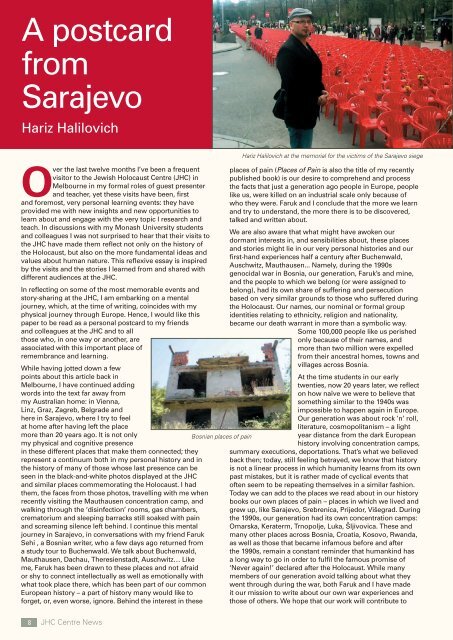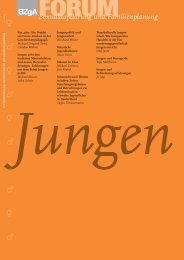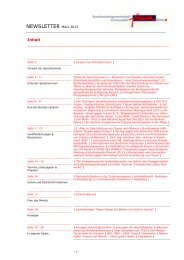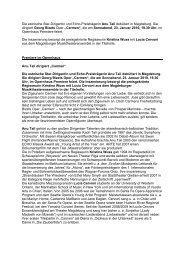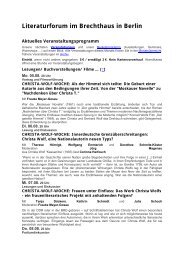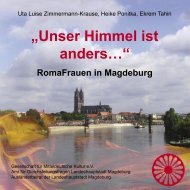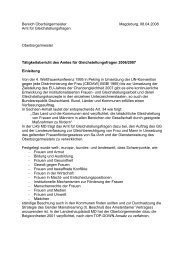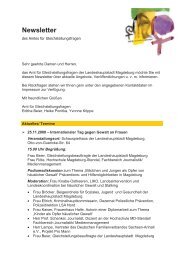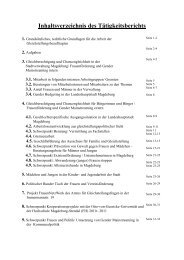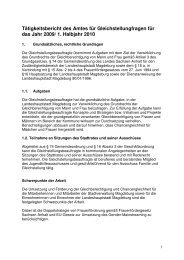Raoul Wallenberg becomes Australia's first honorary citizen
Raoul Wallenberg becomes Australia's first honorary citizen
Raoul Wallenberg becomes Australia's first honorary citizen
You also want an ePaper? Increase the reach of your titles
YUMPU automatically turns print PDFs into web optimized ePapers that Google loves.
A postcard<br />
from<br />
Sarajevo<br />
Hariz Halilovich<br />
Over the last twelve months I’ve been a frequent<br />
visitor to the Jewish Holocaust Centre (JHC) in<br />
Melbourne in my formal roles of guest presenter<br />
and teacher, yet these visits have been, <strong>first</strong><br />
and foremost, very personal learning events: they have<br />
provided me with new insights and new opportunities to<br />
learn about and engage with the very topic I research and<br />
teach. In discussions with my Monash University students<br />
and colleagues I was not surprised to hear that their visits to<br />
the JHC have made them reflect not only on the history of<br />
the Holocaust, but also on the more fundamental ideas and<br />
values about human nature. This reflexive essay is inspired<br />
by the visits and the stories I learned from and shared with<br />
different audiences at the JHC.<br />
In reflecting on some of the most memorable events and<br />
story-sharing at the JHC, I am embarking on a mental<br />
journey, which, at the time of writing, coincides with my<br />
physical journey through Europe. Hence, I would like this<br />
paper to be read as a personal postcard to my friends<br />
and colleagues at the JHC and to all<br />
those who, in one way or another, are<br />
associated with this important place of<br />
remembrance and learning.<br />
While having jotted down a few<br />
points about this article back in<br />
Melbourne, I have continued adding<br />
words into the text far away from<br />
my Australian home: in Vienna,<br />
Linz, Graz, Zagreb, Belgrade and<br />
here in Sarajevo, where I try to feel<br />
at home after having left the place<br />
more than 20 years ago. It is not only<br />
Bosnian places of pain<br />
my physical and cognitive presence<br />
in these different places that make them connected; they<br />
represent a continuum both in my personal history and in<br />
the history of many of those whose last presence can be<br />
seen in the black-and-white photos displayed at the JHC<br />
and similar places commemorating the Holocaust. I had<br />
them, the faces from those photos, travelling with me when<br />
recently visiting the Mauthausen concentration camp, and<br />
walking through the ‘disinfection’ rooms, gas chambers,<br />
crematorium and sleeping barracks still soaked with pain<br />
and screaming silence left behind. I continue this mental<br />
journey in Sarajevo, in conversations with my friend Faruk<br />
Sehić, a Bosnian writer, who a few days ago returned from<br />
a study tour to Buchenwald. We talk about Buchenwald,<br />
Mauthausen, Dachau, Theresienstadt, Auschwitz… Like<br />
me, Faruk has been drawn to these places and not afraid<br />
or shy to connect intellectually as well as emotionally with<br />
what took place there, which has been part of our common<br />
European history – a part of history many would like to<br />
forget, or, even worse, ignore. Behind the interest in these<br />
Hariz Halilovich at the memorial for the victims of the Sarajevo siege<br />
places of pain (Places of Pain is also the title of my recently<br />
published book) is our desire to comprehend and process<br />
the facts that just a generation ago people in Europe, people<br />
like us, were killed on an industrial scale only because of<br />
who they were. Faruk and I conclude that the more we learn<br />
and try to understand, the more there is to be discovered,<br />
talked and written about.<br />
We are also aware that what might have awoken our<br />
dormant interests in, and sensibilities about, these places<br />
and stories might lie in our very personal histories and our<br />
<strong>first</strong>-hand experiences half a century after Buchenwald,<br />
Auschwitz, Mauthausen... Namely, during the 1990s<br />
genocidal war in Bosnia, our generation, Faruk’s and mine,<br />
and the people to which we belong (or were assigned to<br />
belong), had its own share of suffering and persecution<br />
based on very similar grounds to those who suffered during<br />
the Holocaust. Our names, our nominal or formal group<br />
identities relating to ethnicity, religion and nationality,<br />
became our death warrant in more than a symbolic way.<br />
Some 100,000 people like us perished<br />
only because of their names, and<br />
more than two million were expelled<br />
from their ancestral homes, towns and<br />
villages across Bosnia.<br />
At the time students in our early<br />
twenties, now 20 years later, we reflect<br />
on how naïve we were to believe that<br />
something similar to the 1940s was<br />
impossible to happen again in Europe.<br />
Our generation was about rock ’n’ roll,<br />
literature, cosmopolitanism – a light<br />
year distance from the dark European<br />
history involving concentration camps,<br />
summary executions, deportations. That’s what we believed<br />
back then; today, still feeling betrayed, we know that history<br />
is not a linear process in which humanity learns from its own<br />
past mistakes, but it is rather made of cyclical events that<br />
often seem to be repeating themselves in a similar fashion.<br />
Today we can add to the places we read about in our history<br />
books our own places of pain – places in which we lived and<br />
grew up, like Sarajevo, Srebrenica, Prijedor, Višegrad. During<br />
the 1990s, our generation had its own concentration camps:<br />
Omarska, Keraterm, Trnopolje, Luka, Šljivovica. These and<br />
many other places across Bosnia, Croatia, Kosovo, Rwanda,<br />
as well as those that became infamous before and after<br />
the 1990s, remain a constant reminder that humankind has<br />
a long way to go in order to fulfil the famous promise of<br />
‘Never again!’ declared after the Holocaust. While many<br />
members of our generation avoid talking about what they<br />
went through during the war, both Faruk and I have made<br />
it our mission to write about our own war experiences and<br />
those of others. We hope that our work will contribute to<br />
8<br />
JHC Centre News


